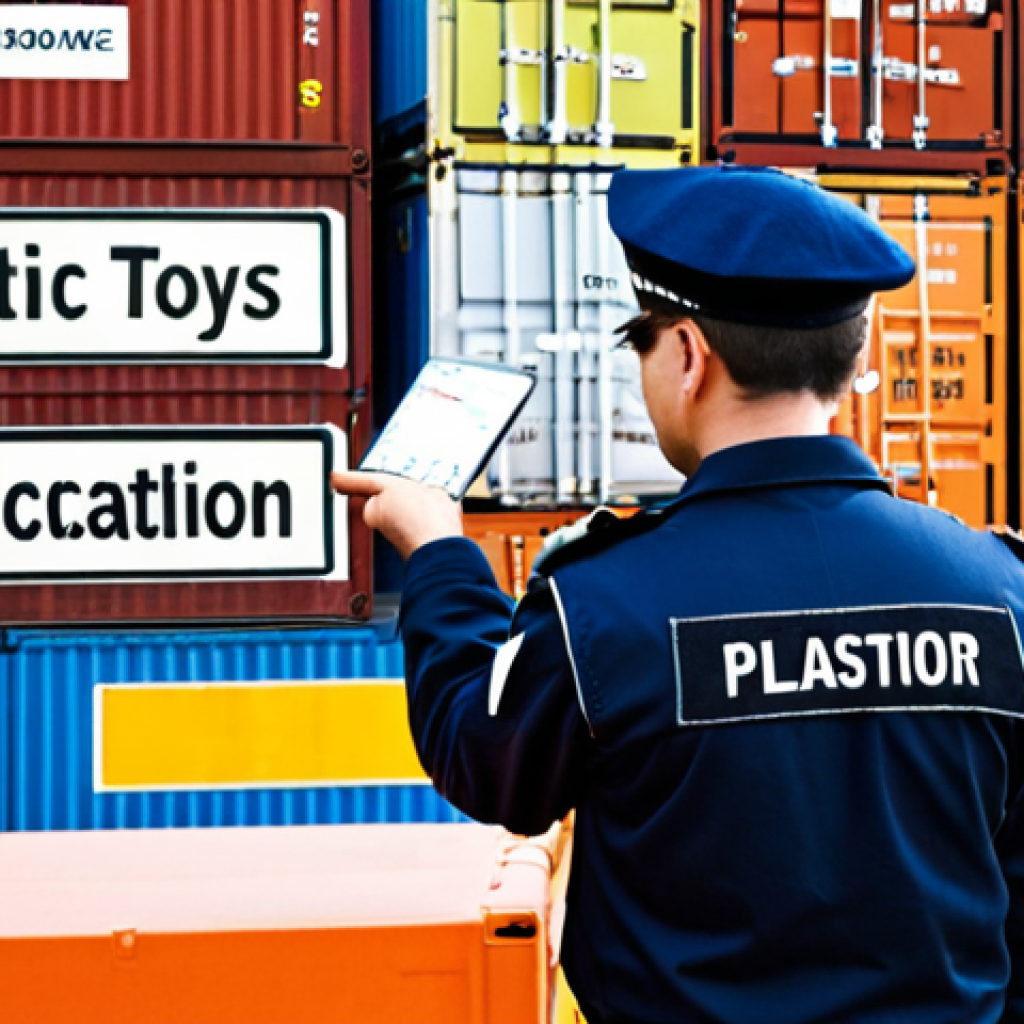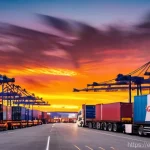In the fast-paced world of international logistics, mistakes are, unfortunately, a part of the game. I’ve seen firsthand how even the most seasoned professionals can slip up – mislabeling a shipment, miscalculating duties, or simply sending goods to the wrong address.
These aren’t just minor inconveniences; they can lead to hefty fines, delayed deliveries, and unhappy customers. But the real test isn’t whether mistakes happen, it’s how we respond to them.
Handling these situations with speed, transparency, and a commitment to finding solutions is crucial. Let’s delve into some common errors in international logistics and explore effective strategies for navigating them.
Let’s figure it out in detail in the following article!
## Navigating the Maze of Misdeclared GoodsOne of the most common headaches in international logistics is dealing with misdeclared goods. This can range from innocent mistakes in paperwork to deliberate attempts to evade duties and taxes.
I remember one particular incident where a client shipped a container full of “plastic toys,” only for customs to discover a stash of high-end electronics hidden inside.
The ensuing investigation caused weeks of delays and significant financial penalties.
Understanding the Roots of Misdeclaration

Misdeclarations often stem from a lack of understanding of complex tariff codes and regulations. Small businesses, in particular, may struggle to accurately classify their goods.
Proactive Measures to Avoid Misdeclaration
The best approach is always prevention. Thoroughly educate your team on proper classification procedures, maintain detailed records, and consider using a customs broker to help navigate the complexities.
The Perilous Path of Documentation Discrepancies
In international shipping, paperwork is king. A single error or omission in documents like the commercial invoice, packing list, or bill of lading can trigger a chain of costly problems.
I’ve seen shipments held up for weeks because the weight declared on the invoice didn’t match the actual weight.
The High Cost of Inaccurate Paperwork
Inaccurate paperwork can lead to delays, fines, and even the seizure of goods. It’s crucial to ensure that all documents are accurate, complete, and consistent.
Digital Solutions for Seamless Documentation
Thankfully, technology is making documentation easier. Embrace digital solutions like electronic data interchange (EDI) and blockchain to streamline processes and reduce errors.
When Cargo Goes Astray: Lost or Damaged Shipments
Despite our best efforts, cargo can sometimes go missing or get damaged in transit. Weather, accidents, and even theft can all contribute to these unfortunate events.
I once had a client who lost an entire shipment of valuable artwork due to a rogue wave. The emotional and financial impact was devastating.
Immediate Actions Following Loss or Damage
The moment you suspect a shipment is lost or damaged, take immediate action. Notify the carrier, file a claim with your insurance provider, and document everything meticulously.
Investing in Robust Insurance Coverage
Comprehensive cargo insurance is a must-have for any business involved in international logistics. Make sure your policy covers a wide range of risks and provides adequate protection.
The Labyrinth of Customs Clearance Delays
Customs clearance can be a major bottleneck in the international shipping process. Delays can occur due to a variety of factors, including increased security checks, complex regulations, and incomplete documentation.
I recall a shipment of perishable goods that was held up at customs due to a minor labeling issue. By the time the issue was resolved, the goods were no longer fit for sale.
Common Causes of Customs Clearance Delays
Common causes include inaccurate documentation, misdeclared goods, and unpaid duties. Being proactive and addressing potential issues early can help prevent delays.
Building Strong Relationships with Customs Brokers
A good customs broker can be your best friend when it comes to navigating the complexities of customs clearance. Choose a broker with a proven track record and a deep understanding of local regulations.
Bridging the Communication Gap: Language and Cultural Barriers
International logistics involves working with people from different cultures and language backgrounds. Misunderstandings can arise due to language barriers, cultural differences, and varying communication styles.
I once witnessed a major disagreement between a shipper and a carrier because they couldn’t agree on the interpretation of a key clause in their contract.
The Importance of Clear and Concise Communication
Clear, concise, and culturally sensitive communication is essential. Use simple language, avoid jargon, and be aware of cultural nuances.
Leveraging Technology for Seamless Communication
Translation tools, video conferencing, and other technologies can help bridge the communication gap. Consider investing in language training for your team to improve cross-cultural communication skills.
The Pitfalls of Payment Problems and Financial Risks
International transactions can be complex and involve a variety of financial risks. Payment problems, currency fluctuations, and fraud can all impact your bottom line.
I once had a client who lost a significant amount of money due to a sudden devaluation of the local currency.
Mitigating Financial Risks in International Trade
To mitigate financial risks, use secure payment methods, hedge against currency fluctuations, and conduct thorough due diligence on all your partners.
The Value of Trade Finance Solutions
Trade finance solutions like letters of credit and export credit insurance can provide added protection and peace of mind. Here’s a table summarizing the key errors and solutions we’ve discussed:
| Error | Description | Solutions |
|---|---|---|
| Misdeclared Goods | Inaccurate classification of goods, leading to fines and delays. | Educate staff, maintain records, use customs brokers. |
| Documentation Discrepancies | Errors or omissions in key shipping documents. | Ensure accuracy, use digital solutions, double-check everything. |
| Lost/Damaged Shipments | Cargo goes missing or gets damaged during transit. | Immediate notification, insurance claim, comprehensive insurance. |
| Customs Clearance Delays | Delays due to documentation, regulations, or security checks. | Accurate paperwork, proactive approach, strong broker relationships. |
| Communication Barriers | Misunderstandings due to language and cultural differences. | Clear communication, technology, language training. |
| Payment Problems | Financial risks, currency fluctuations, fraud. | Secure payment methods, hedging, due diligence, trade finance. |
Staying Ahead of the Curve: Adapting to Evolving Regulations
International trade regulations are constantly evolving. New laws, trade agreements, and security measures are implemented regularly. Keeping up with these changes can be a challenge, but it’s essential for staying compliant and avoiding penalties.
I’ve seen companies struggle to adapt to new regulations, leading to costly mistakes and lost opportunities.
Continuous Learning and Professional Development
Invest in continuous learning and professional development for your team. Attend industry conferences, subscribe to relevant publications, and stay informed about regulatory changes.
Seeking Expert Guidance and Support
Don’t hesitate to seek expert guidance and support from legal professionals, consultants, and industry associations. They can provide valuable insights and help you navigate the complexities of international trade regulations.
Navigating the intricate world of international logistics can feel like traversing a minefield. But by understanding the common pitfalls and implementing proactive solutions, you can minimize risks, improve efficiency, and ultimately boost your bottom line.
Trust me, as someone who’s seen firsthand the chaos a single misstep can cause, taking these precautions is well worth the effort. I once helped a small artisan business navigate a complex customs issue, and seeing them succeed despite the odds was incredibly rewarding.
It’s all about being prepared and knowing where the potential problems lie.
In Conclusion
The world of international logistics presents a unique set of challenges. From documentation mishaps to cultural misunderstandings, there are plenty of opportunities for errors. However, by prioritizing accuracy, communication, and continuous learning, businesses can overcome these obstacles and thrive in the global marketplace. Just remember to learn from your mistakes (we all make them!), and always be ready to adapt to the ever-changing landscape of global trade.
Good-to-Know Information
1. Incoterms: Understanding Incoterms (International Commercial Terms) like FOB, CIF, and EXW is crucial for clearly defining responsibilities between buyer and seller regarding costs, risks, and insurance during international shipping.
2. HS Codes: Harmonized System (HS) codes are used worldwide to classify traded products. Accurate HS code classification ensures proper tariff application and compliance with import/export regulations. You can usually find HS codes using online search tools provided by customs authorities or trade organizations.
3. Customs Bonds: In the U.S., a customs bond guarantees compliance with customs regulations and payment of duties and taxes. They are often required for shipments exceeding a certain value or frequency.
4. Free Trade Agreements (FTAs): FTAs between countries can significantly reduce or eliminate tariffs on certain goods. Understanding and utilizing applicable FTAs can lead to substantial cost savings. For example, the USMCA (United States-Mexico-Canada Agreement) offers preferential tariff treatment for goods originating within North America.
5. Cargo Insurance Options: Beyond basic insurance, consider specialized coverage like All Risks insurance, which provides broader protection against physical loss or damage from external causes during transit. Also, understand the difference between “general average” and other types of insurance claims; general average can be a complex process when multiple parties share in losses from a maritime accident.
Key Takeaways
* Prioritize accuracy in all documentation to avoid costly delays and fines.
* Invest in comprehensive cargo insurance to protect against loss or damage.
* Build strong relationships with customs brokers and logistics providers for expert guidance.
* Communicate clearly and effectively with all stakeholders to minimize misunderstandings.
* Stay informed about evolving regulations and adapt your processes accordingly.
Frequently Asked Questions (FAQ) 📖
Q: What are some common errors in international logistics besides the ones already mentioned?
A: Oh man, where do I even begin? Beyond mislabeling and duty screw-ups, I’ve seen shipments held up because of incomplete or incorrect paperwork – think missing certificates of origin or commercial invoices that don’t match the goods.
Currency exchange rate errors can also throw a wrench into the works, especially when dealing with volatile markets. And let’s not forget good ol’ communication breakdowns between parties in different time zones, which can lead to misunderstandings and delays.
Honestly, it’s a constant juggling act!
Q: How can companies proactively prevent these kinds of errors from happening in the first place?
A: That’s the million-dollar question, right? From my experience, investing in robust training programs for logistics staff is a huge step. They need to be up-to-date on the latest regulations and best practices.
Also, implementing a solid TMS (Transportation Management System) can automate a lot of the process and reduce manual errors. And don’t underestimate the power of good communication!
Regular check-ins with suppliers, customs brokers, and carriers can help catch potential problems before they snowball. I remember one time, a supplier was about to ship goods with the wrong Incoterms, but a quick phone call caught it just in time.
Saved us a massive headache.
Q: What’s the best way to deal with an angry customer when a logistics error has caused a significant delay or financial loss?
A: Ugh, dealing with upset customers is never fun, but honesty and empathy are key. First, acknowledge their frustration and take ownership of the problem, even if it wasn’t directly your fault.
Next, explain the situation clearly and transparently, without making excuses. Then, offer a solution! Whether it’s expediting the shipment, offering a partial refund, or compensating for their losses, do whatever you can to make things right.
And most importantly, keep them informed every step of the way. I once had a customer whose shipment was delayed by a week due to a customs inspection.
I called them every day with updates, and while they were still annoyed, they appreciated the constant communication and ultimately remained a loyal customer.
It’s all about turning a negative into a “we handled it well” kind of situation.
📚 References
Wikipedia Encyclopedia






